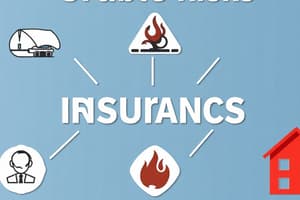Podcast
Questions and Answers
What term is often used by insurance professionals to represent the potential for loss?
What term is often used by insurance professionals to represent the potential for loss?
- Peril (correct)
- Risk
- Liability
- Hazard
Which of the following is an example of a physical hazard in insurance?
Which of the following is an example of a physical hazard in insurance?
- Careless attitude towards safety
- Security measures at a business (correct)
- Fraudulent claims
- Age of a driver
What kind of hazard involves the conduct and attitude of people?
What kind of hazard involves the conduct and attitude of people?
- Natural hazard
- Physical hazard
- Environmental hazard
- Moral hazard (correct)
A shop with high security is an example of what type of hazard?
A shop with high security is an example of what type of hazard?
What is the function of key points in the study material?
What is the function of key points in the study material?
Which situation best represents a moral hazard?
Which situation best represents a moral hazard?
Which feature is designed to test understanding through practical exercises?
Which feature is designed to test understanding through practical exercises?
Which of the following describes a moral hazard concerning a business's management?
Which of the following describes a moral hazard concerning a business's management?
What do self-test questions at the end of each chapter help achieve?
What do self-test questions at the end of each chapter help achieve?
What can be considered a measure of physical hazard related to property construction?
What can be considered a measure of physical hazard related to property construction?
What purpose does the 'Be aware' feature serve in the study text?
What purpose does the 'Be aware' feature serve in the study text?
Which of the following is NOT an example of moral hazard?
Which of the following is NOT an example of moral hazard?
Which of the following features introduces key concepts in the study text?
Which of the following features introduces key concepts in the study text?
What is the benefit of referring back to the learning outcomes after studying a chapter?
What is the benefit of referring back to the learning outcomes after studying a chapter?
What does conduct risk involve?
What does conduct risk involve?
What resource is mentioned for further information and background on topics?
What resource is mentioned for further information and background on topics?
Which factor is NOT mentioned as impacting the supply of materials or services?
Which factor is NOT mentioned as impacting the supply of materials or services?
Which of the following features encourages revisiting previously learned points?
Which of the following features encourages revisiting previously learned points?
What is one risk associated with climate change and sustainability?
What is one risk associated with climate change and sustainability?
What does insurance risk primarily relate to?
What does insurance risk primarily relate to?
Which scenario represents a transitional risk related to climate change?
Which scenario represents a transitional risk related to climate change?
What might happen if a business fails to maintain environmentally sustainable practices?
What might happen if a business fails to maintain environmentally sustainable practices?
How might Brexit be characterized concerning supply chain risks?
How might Brexit be characterized concerning supply chain risks?
What is a consequence of inadequate pricing and underwriting in the insurance sector?
What is a consequence of inadequate pricing and underwriting in the insurance sector?
What is an example of a hazard linked to the peril of explosion?
What is an example of a hazard linked to the peril of explosion?
Which of the following best illustrates bad moral hazard regarding driving?
Which of the following best illustrates bad moral hazard regarding driving?
What contributes to the classification of a young driver as a potential risk?
What contributes to the classification of a young driver as a potential risk?
Which hazard is associated with lightning as a natural peril?
Which hazard is associated with lightning as a natural peril?
What is a consequence of poor security in a company?
What is a consequence of poor security in a company?
What does the term 'groupthink' refer to in decision-making?
What does the term 'groupthink' refer to in decision-making?
Which method can help strengthen objectivity in group decision-making about risk?
Which method can help strengthen objectivity in group decision-making about risk?
What factor should be considered alongside hazard assessment in risk management?
What factor should be considered alongside hazard assessment in risk management?
Which of the following might indicate a bad moral hazard in business operations?
Which of the following might indicate a bad moral hazard in business operations?
What is an important factor when communicating risk to an audience?
What is an important factor when communicating risk to an audience?
Which hazard is related to collision incidents?
Which hazard is related to collision incidents?
What is the term used to describe a person's or group’s willingness to accept risk?
What is the term used to describe a person's or group’s willingness to accept risk?
Which of the following behaviors best exemplifies risk-seeking behavior?
Which of the following behaviors best exemplifies risk-seeking behavior?
Which behavior is indicative of a risk-avoiding individual?
Which behavior is indicative of a risk-avoiding individual?
What factor might lead individuals to accept a risk that has effects further in the future?
What factor might lead individuals to accept a risk that has effects further in the future?
What can result from a lack of clear ground rules in group risk decisions?
What can result from a lack of clear ground rules in group risk decisions?
What primarily influences an individual's or organization’s self-imposed risk tolerance level?
What primarily influences an individual's or organization’s self-imposed risk tolerance level?
How does risk appetite differ from risk tolerance?
How does risk appetite differ from risk tolerance?
Which of the following best defines risk appetite?
Which of the following best defines risk appetite?
What role does the Board of Directors play pertinent to risk tolerance in an organization?
What role does the Board of Directors play pertinent to risk tolerance in an organization?
What factor might NOT influence the risk tolerance of a company like the insurance provider mentioned?
What factor might NOT influence the risk tolerance of a company like the insurance provider mentioned?
In the context of risk management, which action is most likely associated with an organization exhibiting high risk appetite?
In the context of risk management, which action is most likely associated with an organization exhibiting high risk appetite?
Why might an insurance company’s underwriter temporarily accept a higher level of risk?
Why might an insurance company’s underwriter temporarily accept a higher level of risk?
What does the term 'cash liquidity' refer to in the context of risk tolerance?
What does the term 'cash liquidity' refer to in the context of risk tolerance?
Flashcards
Activities
Activities
Exercises designed to reinforce learning and understanding by applying concepts to practical scenarios.
Key points
Key points
Short summaries of key points at the end of each chapter to help you remember important information.
Key terms
Key terms
Essential terms and concepts introduced within each chapter, highlighting important vocabulary and knowledge.
Case studies
Case studies
Signup and view all the flashcards
Refer to:
Refer to:
Signup and view all the flashcards
Consider this:
Consider this:
Signup and view all the flashcards
Reinforce:
Reinforce:
Signup and view all the flashcards
Examples:
Examples:
Signup and view all the flashcards
Peril
Peril
Signup and view all the flashcards
Hazard
Hazard
Signup and view all the flashcards
Physical Hazard
Physical Hazard
Signup and view all the flashcards
Moral Hazard
Moral Hazard
Signup and view all the flashcards
Security Protection
Security Protection
Signup and view all the flashcards
Construction Standards
Construction Standards
Signup and view all the flashcards
Carelessness
Carelessness
Signup and view all the flashcards
Dishonesty
Dishonesty
Signup and view all the flashcards
Conduct risk
Conduct risk
Signup and view all the flashcards
Clinical risk
Clinical risk
Signup and view all the flashcards
Insurance risk
Insurance risk
Signup and view all the flashcards
Sustainability risk
Sustainability risk
Signup and view all the flashcards
Supply chain risk
Supply chain risk
Signup and view all the flashcards
Pressures on supply chain
Pressures on supply chain
Signup and view all the flashcards
Physical risks
Physical risks
Signup and view all the flashcards
Transitional risks
Transitional risks
Signup and view all the flashcards
What is a peril?
What is a peril?
Signup and view all the flashcards
What is a hazard?
What is a hazard?
Signup and view all the flashcards
What is a physical hazard?
What is a physical hazard?
Signup and view all the flashcards
What is a moral hazard?
What is a moral hazard?
Signup and view all the flashcards
What is an example of moral hazard?
What is an example of moral hazard?
Signup and view all the flashcards
What is security protection?
What is security protection?
Signup and view all the flashcards
What are construction standards?
What are construction standards?
Signup and view all the flashcards
What is carelessness?
What is carelessness?
Signup and view all the flashcards
Groupthink
Groupthink
Signup and view all the flashcards
Risk Perception
Risk Perception
Signup and view all the flashcards
Delay Effect
Delay Effect
Signup and view all the flashcards
Risk Appetite
Risk Appetite
Signup and view all the flashcards
Risk-Seeking Behavior
Risk-Seeking Behavior
Signup and view all the flashcards
Risk-Avoiding Behavior
Risk-Avoiding Behavior
Signup and view all the flashcards
Controllability
Controllability
Signup and view all the flashcards
Familiarity
Familiarity
Signup and view all the flashcards
Risk Tolerance
Risk Tolerance
Signup and view all the flashcards
Capital
Capital
Signup and view all the flashcards
Business Strategy
Business Strategy
Signup and view all the flashcards
Government Regulation
Government Regulation
Signup and view all the flashcards
Underwriting Profit
Underwriting Profit
Signup and view all the flashcards
Underwriting
Underwriting
Signup and view all the flashcards
Study Notes
Introduction to Risk Management 111 Study Text
- This is a Chartered Insurance Institute (CII) 2024 study text for Introduction to Risk Management 111.
- Access to RevisionMate (an online study support tool) is available until December 31, 2024.
- This includes printable PDF and ebook versions of the study text, a student discussion forum, and an examination guide. Access RevisionMate via ciigroup.org/login using your login details.
- Updates and amendments to the syllabus and content will be posted online. Users will receive notifications via email. Updates can be found at www.cii.co.uk/qualifications.
Revision Mate
- RevisionMate is an online study support tool to aid student study and improve exam success chances.
- Access to the tool is only available until December 31st 2024.
Updates and Amendments
- As part of your enrolment, any modifications to the exam syllabus, and content updates, will be posted online.
- Subscribers will be informed by email when a relevant update has been published.
Examination syllabus
- The objective is to provide knowledge and understanding of the basic elements of risk and the role of insurance within these principles.
- The assessment will consist of 75 multiple-choice questions (MCQs) over a 2-hour period.
- The examination period is from 1 January 2024 to 31 December 2024.
- The examination will test your knowledge of English law and practice.
- The study guide is accessible via screen-reader attachments to your web browser.
- The exam guide is accessible on the CII website and in RevisionMate.
Study Skills
- Active learning is encouraged and will improve understanding of the subject matter.
- Underline or highlight key terms and phrases.
- Make notes in the text, linking them to particular pages.
- Chapter numbers are marked in the margins for easy referencing.
- Use the 'refer to' boxes to access relevant information from other CII study texts.
- Refer to the syllabus reading list to expand your knowledge.
- Relate concepts to your work or organisation.
Exam Guidance
- Answer questions carefully, identifying the actual question being asked.
- Try to answer all questions, even if you are unsure.
- Look out for negative questions (questions that ask "Which of the following is NOT…").
Risk
- Risk has always been a part of life.
- Modern risk management is a growing discipline and a useful tool for businesses and governments to mitigate harm.
- There are significant risks to organisations globally, such as the pandemic or climate change along with new types of risks that were formerly thought to be unique to specific industries. These new forms of risk are increasingly connected and interdependent across the global economy.
Risk and Society
- Today's society is often more risk averse than in the past.
- The frequency and severity of disasters are increasing.
- Legal factors are often involved in risk management as Governments impose laws and regulations in response to risk events.
- Traditional risk avoidance and treatment approaches are evolving into more holistic enterprise-wide approaches.
Components of Risk
- There are three types of risks in risk analysis; pure risks, speculative risks and particular risks.
- Pure risks have the potential for only loss or no change in the situation.
- Speculative risks have the possibility of gain or loss.
- Peril is the event itself which gives rise to a loss; hazard describes what influences the operation or effect of a peril.
- Physical hazards are related to the measurable physical characteristics of the risk.
- Moral hazards describe human attitudes and behaviours.
- Examples in the text involve physical and moral hazards as well as those surrounding business.
Risk Assessment
- This chapter focuses on identification, analysis, and evaluation of risk within an organisation.
- The risk assessment process attempts to classify and measure risks (using codes and numerical values for likelihood, frequency and severity) to decide the best course of action.
- Risk assessment involves identifying risks, describing and recording risks, and analysing them to determine their impact.
- Presenting the risk analysis as a matrix or map helps to visually summarise frequency/likelihood and severity/impact for decision making.
- Risk is to be evaluated at the 'inherent' level, or with risk control/mitigation factored in; that is, examining risks from a "worst-case scenario" or "best-case scenario" based on the potential or observed effects of a risk.
Risk Treatment
- This chapter discusses the various options for treating risk; eliminating it, controlling it, transferring it, or retaining it.
- Risk elimination is most effective in the design stage, but expensive.
- Risk control involves procedures or alterations (e.g. physical, education, or regulations) to reduce either the frequency or the severity of a risk.
- Risk transfer involves transferring the financial consequences of a risk event to another party, such as via an insurance contract.
- Risk retention involves the organisation handling their own risk in all possible forms and is sometimes involuntary (e.g., unavoidable risks), or voluntary (e.g., calculated risks).
Risk Management Roles and Responsibilities
- This chapter examines the roles of directors and senior executives, risk managers and risk teams in risk management.
- It explores the different approaches to risk management across varying global/national and private/public sectors in organisations.
- Various organisations and roles involved in risk management (e.g., Chief Risk Officer, CRO) are discussed.
- The responsibilities of directors, boards, and senior executives in risk management are reviewed; these include a risk subcommittee.
- This chapter explores and examines how the three lines of defense principle is implemented in practice (particularly in regard to internal audit roles) in organisations of varying scales.
- A 'hybrid approach' in managing risk is presented.
Studying That Suits You
Use AI to generate personalized quizzes and flashcards to suit your learning preferences.




